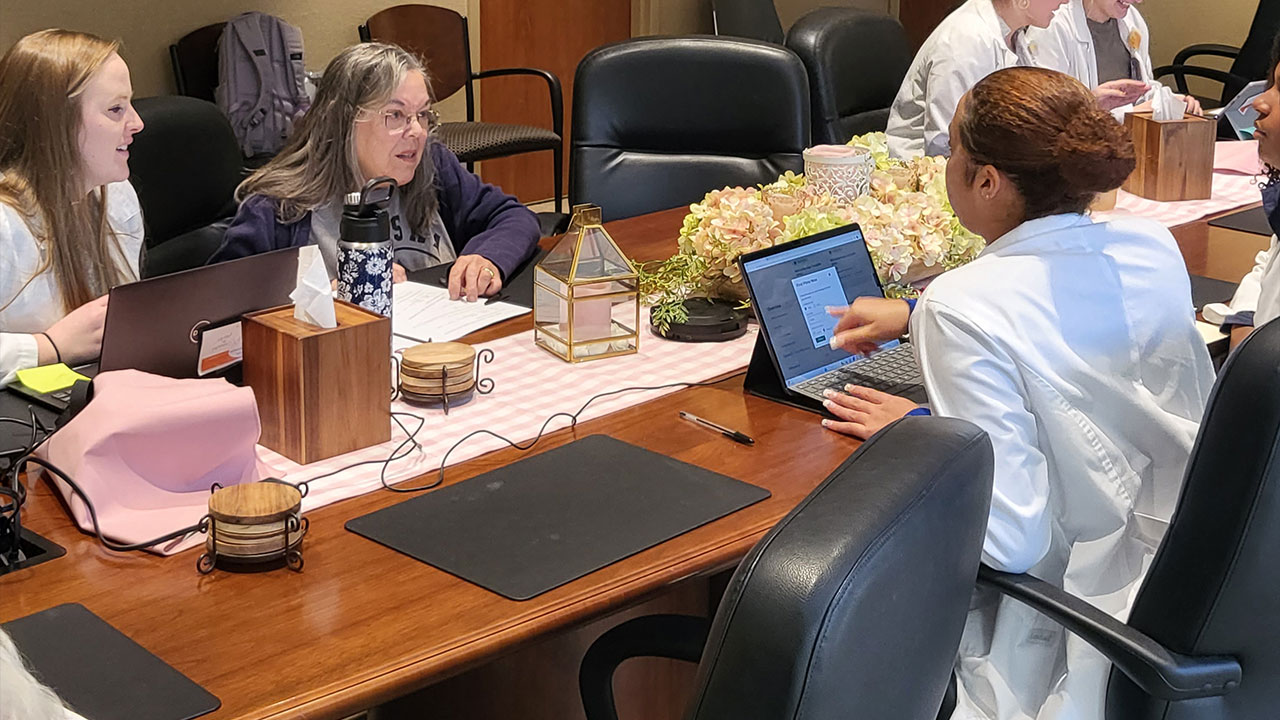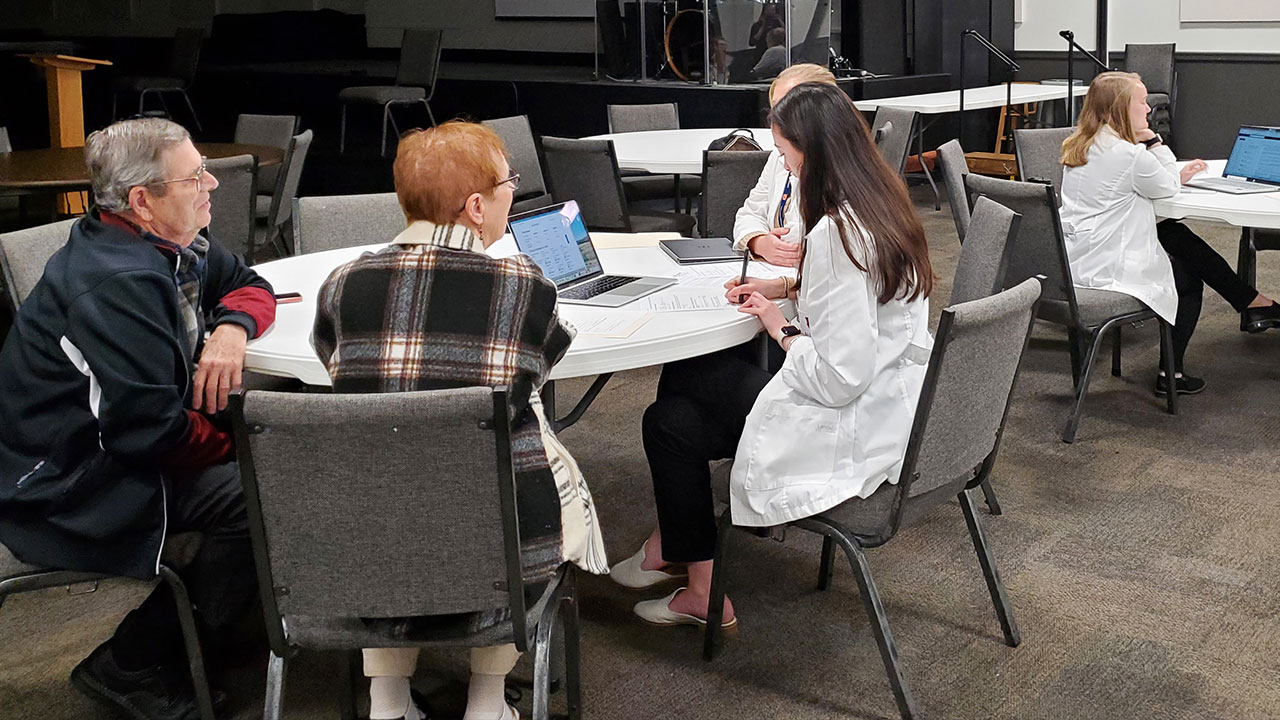content body
Mandy McAllister was in her second year of pharmacy school when she volunteered to help at an AU-SHIP event at Auburn United Methodist Church.
The Auburn University (AU) Harrison College of Pharmacy has partnered with the Alabama State Health Insurance Assistance Program (SHIP) for 10 years now, providing outreach events across the state aimed at helping Alabama residents select the best Medicare plan to fit their needs — Medicare Advantage (Part C) or the prescription drug plan (Part D).
“I had the opportunity to sit down with two patients who had no idea where to start when it came to selecting an insurance plan for the upcoming year,” recalled McAllister. “Utilizing the Medicare Plan Finder, we were able to compare various health insurance plans to determine what would be most cost-effective for their specific medications and health care needs.
“In a short period of time, these patients who came in not knowing where to start left with confidence in the health insurance plan they selected. Not only were our efforts able to save them hundreds of dollars, but the patients left with foundational knowledge of knowing how to approach and understand health insurance.”
Since 2013, almost 600 Auburn pharmacy students have been trained to work with SHIP counselors at nearly 70 outreach events across Alabama, including Auburn, Opelika, Phenix City, Alexander City, Tuskegee, Montgomery, Roanoke, Valley, Union Springs, Mobile, Bayou La Batre, Satsuma and Semmes.
In 10 years, the collaboration has served 845 Medicare beneficiaries in Alabama with an average annual cost savings of nearly $1,200 for those who enrolled in a new Medicare Part D or Medicare Advantage plan.
For McAllister and her fellow classmates, AU-SHIP was an opportunity to apply what they learned in class to the local community.
Jessica Vail said the event allowed her “to connect with patients in a way I had never done before. I think hosting programs like this is a fantastic way for pharmacists to connect with members of the community.”
Several students reported the experience increased their confidence in working with patients, as well as their familiarity with Medicare plans.
Shannon Woods appreciated the opportunity to practice classroom lessons in the real world and to experience the impact pharmacists can have beyond medications.
“A couple was asking if they should change their Medicare coverage for the upcoming year. The plan they were considering would have cost them around $300 more per month than their current plan,” she explained. “By the end of the interaction, the couple decided to stay with their current federal plan. They were grateful they attended the event to ask their questions and felt relieved after the interaction.”
Since McAllister considers pharmacists “the most accessible health care provider,” she feels it is appropriate for her and other future pharmacists to understand health insurance and tools like the Medicare Plan Finder. That way, residents who are less likely to understand or be aware of these tools can turn to their pharmacist for assistance.
“Pharmacists have the unique opportunity to help members of their community with aspects of their health care that go beyond medications,” she said. “With such a wide array of differing insurance plans, pharmacists can help patients sift through their overwhelming number of options to better understand them and determine which plan may be best for their individual health care needs.”

Beyond the classroom
When Salisa Westrick was an associate professor in Auburn’s pharmacy school, she taught her students how to select Medicare plans. She created a scenario-based assignment for them to evaluate plans and make recommendations for patients.
“At the time, in addition to showing proficiency on paper, I wanted students to have opportunities to apply their knowledge and skills and help ‘real’ patients in Alabama,” said Westrick, now the Sterling Professor and head of the college’s Department of Health Outcomes Research and Policy.
She earned a competitive grant from Auburn Outreach, partnered with SHIP and started the AU-SHIP program. After that first year, SHIP, through the Alabama Department of Senior Services, has provided financial support.
“It’s been a win-win-win situation from the start. It’s a win for Auburn, a win for SHIP and a win for our Alabama patients,” said Westrick.
Second- and third-year pharmacy students who complete the required didactic portion on Medicare and pass SHIP training can volunteer to assist Medicare beneficiaries in Medicare Advantage plans (Part C) and the Medicare prescription drug coverage (Part D) selection during open enrollment each fall.
Medicare is a federal health insurance program for people 65 and older and for some younger adults with permanent disabilities and medical conditions.
“Selecting the right plan that is appropriate for them is critically important, especially considering more than half of the Medicare beneficiaries now have Medicare Advantage plans,” said Westrick.
During counseling sessions at an AU-SHIP event, Lindsey Hohmann, an assistant professor in the Department of Pharmacy Practice, Westrick or a graduate research assistant are present, along with SHIP counselors, to help answer questions of students and residents.
Students are the primary contact, however, working one-on-one or as partners with residents.
“Students get exposed to real-life cases and utilize the knowledge they learn from the classroom to assist the Medicare beneficiaries,” said Westrick. “I think the experience cultivates a sense of empathy for the beneficiaries when they learn about the cost and the struggles a beneficiary may have.”
An example is when Westrick recalled a student asking her about fairness when they learned that a Medicare beneficiary’s savings prevented her from being eligible to receive the Extra Help assistance to lower the plan cost, even though her income met the requirement. Extra Help is a Medicare program that helps people with limited income and resources pay Medicare Part D costs.
“Another student told me that the husband of a Medicare beneficiary decided not to retire in order to maintain their employer-sponsored insurance since Medicare was not affordable for his wife, who had cancer,” said Westrick. “To me, experience from encounters with real people helps our students become better pharmacists.
“That is, pharmacists who care about their patients.”

Teamwork makes the dream work
Hohmann began helping Westrick run the AU-SHIP program when she came to the Plains in 2015 as a doctoral student in Westrick’s department. Once Hohmann graduated in 2019 and became an assistant professor in the college, Westrick passed the reins to Hohmann as the primary facilitator of the program.
Westrick remains involved as a collaborator, lending her wisdom at some events.
The pair work together to recruit second- and third-year students to volunteer at the outreach events. Hohmann coordinates with the Alabama Department of Senior Services SHIP Director Sharon Jalieba and Dawn Glascock, state coordinator for this project and SHIP coordinator for the South Central Alabama Development Commission’s Area Agency on Aging (SCADC).
During a kickoff event every fall, Hohmann said students “learn the importance of the program and how they can really make a difference in patients’ lives.” Then, students attend a hands-on workshop and practice using the online Medicare Plan Finder to review the different options. Once they pass a training session, they are ready to volunteer at community events.
When the COVID-19 pandemic hit, Medicare patients still needed to be served. SHIP pivoted its outreach efforts to telehealth and virtual meetings, and Westrick and Hohmann followed suit. Auburn and SHIP found the move to be so beneficial to residents after pandemic restrictions were lifted, they agreed to continue offering telehealth, as well as in-person sessions.
Hohmann said that the decision allowed the partnership to help a wider range of individuals than ever before.
“Having been involved in AU-SHIP as a graduate research assistant who helped run the program and now as a faculty coordinator, I have seen our student pharmacists grow in their confidence to assist Medicare patients,” she said. “It is wonderful to see some student pharmacists volunteer in their second year, then return in their third and even fourth years because they saw how much impact they were able to have on patients’ lives.”
With research showing that many Medicare beneficiaries do not select the best plan for themselves because they aren’t seeking assistance, Westrick would like to add a new component to AU-SHIP. By creating a training program for Medicare beneficiaries or their caregivers, they can have the knowledge and confidence in selecting the appropriate Medicare plans.
“It’s clear that this program holds a special place in my heart and for good reason,” she said. “It has a significant impact, not only on pharmacy students but on the wider community and the health care system as a whole.
“Seeing students engage with real-world applications of their learning is incredibly rewarding. Being able to assist beneficiaries in navigating their health care options and potentially saving them money is a valuable service that directly impacts people’s lives.
“This program contributes to the core missions of the university and reflects a commitment to education, research and public service.”




